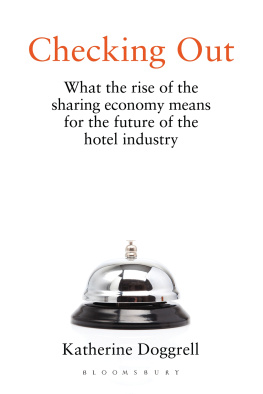Katherine Doggrell analyses the struggles for market between hotels, the sharing economy and the online travel agents in a lively way. For us business folk who just use the beds but work in the many industries about to be disrupted by the impact of AI, FinTech, climate change or variants of the sharing economy the lessons are numerous.
Mark Moody-Stuart, former chairman of Royal Dutch Shell and Anglo American Plc, author of Responsible Leadership
An excellent analysis of why Airbnb and the sharing economy has made such inroads into the traditional hotel market. Katherine Doggrell delivers a punchy wake-up call to the chains who treat guests as a mere commodity.
Ruth Watson, hotelier, broadcaster and food writer
In the style of Brad Stones The Everything Store, Checking Out provides readers with a well-researched and insightful deep-dive into the development of the sharing economy and in particular how it affects the hospitality sector. Katherines investigative style helps highlight issues and perspectives hitherto less visible, making this an essential read for anyone wanting to truly understand the future of the hotel sector.
Peter OConnor, Professor at ESSEC Business School and author of Reviewed
I really enjoyed reading this book, Katherines writing style is wonderful, particularly the way she brings humour into an insightful journey through the rise of the sharing economy and its impact on the hotel industry. Anyone who can bring references to Prince and cricket whilst being informative at the same time gets my vote!
Will Hawkley, Global Head of Leisure & Hospitality, KPMG
Checking Out expertly analyses the threat of the sharing economy, and what the traditional hospitality sector can do to survive. I have always enjoyed Katherines writing style, and she is one of the leading commentators on the hospitality and leisure sector. This book is a must-read for those linked to the industry who wish to remain ahead of the game or for those that simply appreciate a good book!
Tim Helliwell, Head of Hotels, Barclays Bank
For Cameron and Philip, my loves
And for the hotel sector, which puts a roof over my head

Contents
I love hoteliers. If you want to stay up until dawn with the friendliest, smartest, most-likely to have been arrested in Ghana for looking at a statue without a permit people, find yourself a bottle and a hotelier and pull up a wingback chair. But hotels and I are on rocky ground.
The schism first dawned the morning after the night before, as schisms are often wont to do. Waking up with no clear idea of where you are is not limited to excess, but a feature of the global hotel market. The classic design of bed-with-en suite has barely changed since Mary and Joseph decided theyd rather not share with the donkey after all, and one blearily viewed room looks almost exactly like another, no matter what the neon sign over the door.
The world is on the move, in its billions, but while there is more to distract us, there is also more to isolate us. More people live and work alone and have less human contact. Spending the evening in another anonymous box does not warm the soul. As we travel more, we value the comforts of home and that which revives us.
This millennium has seen a shift away from hotel ownership and into franchising for the big hotel chains, as well as a shift in how the operators view the consumer. Where the head in the bed used to be the customer, as the source of their fees and the degrees of separation from the brand and the guest have grown, so the real estate investor has become the more relevant customer for the branded companies.
The global hotel companies live and die by their pipeline: the volume of rooms they are gushing across the planet every quarter. Many a CEO has been jettisoned after failing to maintain a suitable flow and the structure of the sector has shifted to feed this passion for limitless growth. The need to lure hotel investors with fresher, more delicious brands has led to a proliferation of flags. Already got one hotel in London? Never mind, weve got a whole new brand coming, why not have one of those as well? Why not collect the whole set?
While owners were being told that brands were all different the better to avoid territorial arguments to the head in the bed, they all looked very similar. Bed factories, in other words, with only return on investment (ROI) in mind. Branding has made everywhere familiar and nowhere memorable and, in the rush to expand around the world, the art of hospitality has been lost.
Enter the sharing economy. Invisible to the naked eye, it blended perfectly into the neighbourhood (until after dark, when for the unlucky few the sound of hen nights filled the air). The camouflaged threat, the Predator that the hotel sector wakes up sweating about untold numbers of rooms, apartments, houses, yurts, treehouses, yachts, islands. And the degree of separation from the owner was often only one wall.
Airbnb, which dominated the sector and has become the noun-to-verb Hoover of letting people sleep in your spare room, had 7 million listings by 2019, making market leader Marriott International, with 1.4 million roomsis not the watchword of homesharers and the nature of the offer is that it was in constant flux.
The hospitality sector has been unable to agree on the impact of homesharing on its business. In 2014, Richard Solomons, the then-CEO of InterContinental Hotels Group (IHG), said on the sidelines at Davos that homesharing wasnt a threat because IHG was focused on the business guest instead.
Airbnb said it had seen more than 400 million guest arrivals since 2008 and those could all be travellers who wouldnt have packed a bag had homesharing not been an option. It must also include jaded old road warriors desperate to once, maybe just once, slump back on a sofa and eat some soup rather than sit cross-legged on a bed with their laptop, waiting an hour for a tepid club sandwich to arrive from room service. Parents who wanted bedrooms on the same floor as their children. Friends who wanted their own social space. Todays consumer wanted experience , a story to tell when they got back home.
The hotel sector was not alone in facing disruption from an online platform. That the challenge came when the rise of the online travel agents (OTAs) reduced rooms to a mere commodity traded by cost, not the actual experience only served to heighten the issue.
The sharing economy was never just about rooms; it was about redefining what hospitality is, what true service meant and realising that it was no longer wearing a white jacket with gilt buttons. Homesharing came with the promise that you could feel at home while being away, that you could be part of a community and learn about more than you could when staying in a room that looks exactly the same in Albuquerque, Bangkok or Cardiff. That you would be greeted with warmth, not the demand for your credit card in case you went on a thieving spree. That you could put some beers in the fridge and then drink them. In the light. And not the light of the bathroom while you sit on the toilet.
The sharing economy is now being attacked from within, facing the challenge of growing numbers of professional investors who will affect how well it keeps its homespun image, but for the time being the challenge lies with the hotels. There was a time when the hotel sector introduced the world to the wonder of electricity, the marvel of room service, the novelty of the ice machine. Does it once again have the power to inspire love and loyalty? Or will it be marginalised as a relic from a bygone age?












